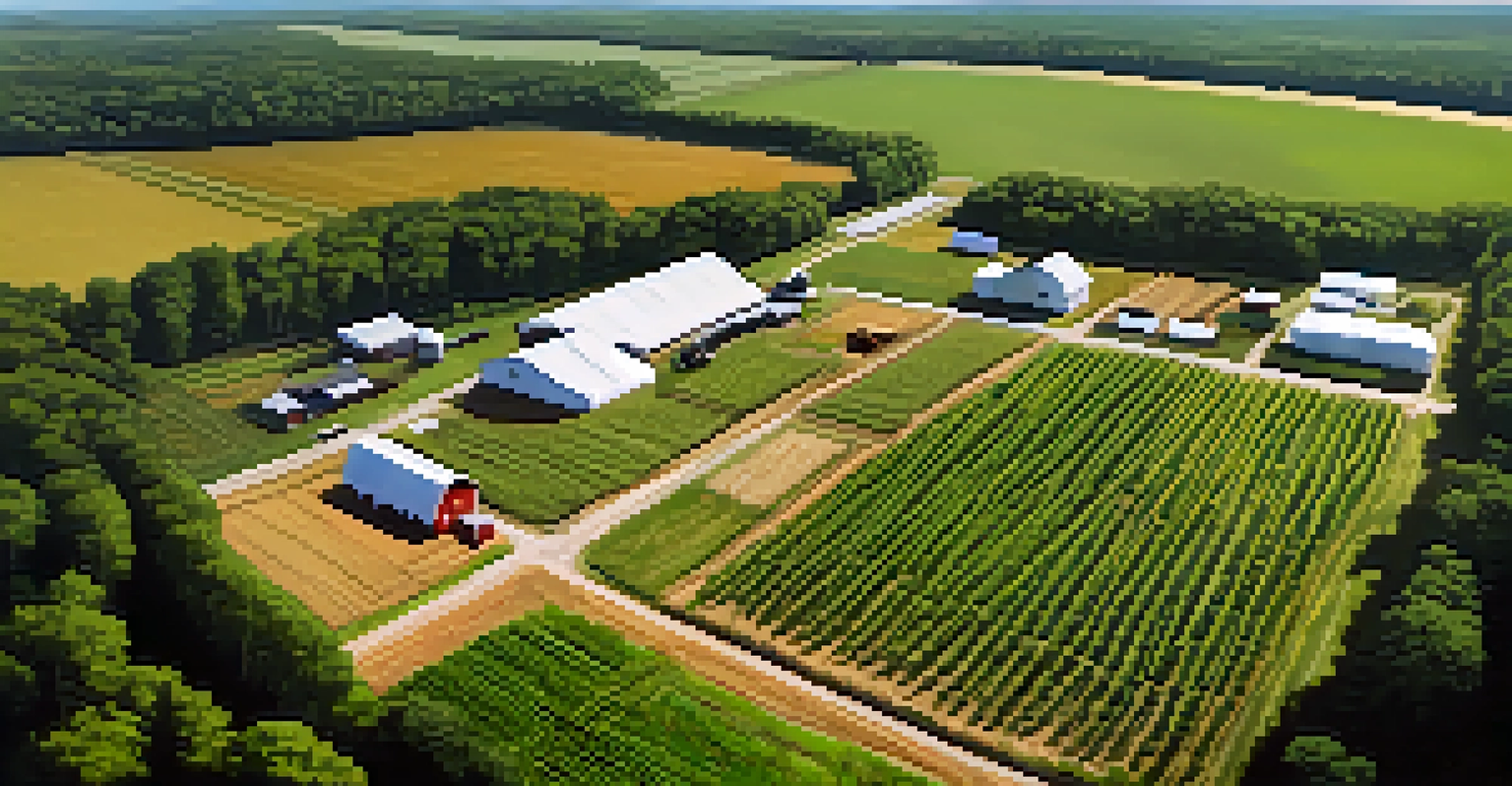The Future of Agriculture in North Carolina: Trends to Watch

Technological Innovations Transforming Farming Practices
The future of agriculture in North Carolina is increasingly tied to technology. Innovations like precision farming tools allow farmers to use data analytics for better crop management. This means improved efficiency, reduced waste, and higher yields, all critical for sustaining the state's agricultural output.
The future of agriculture is not about the farming alone; it is about the community and the environment in which it exists.
Drones and satellite imagery are revolutionizing how farmers monitor their fields. With real-time data, they can quickly identify issues like pest infestations or irrigation needs. These advanced tools not only save time but also enhance decision-making, leading to healthier crops and a more sustainable approach to farming.
As these technologies become more accessible, we can expect a shift in how farms operate. Smaller farms, once limited by resources, can now utilize these tools to compete with larger operations. This democratization of technology could foster a new era of agricultural innovation across North Carolina.
Sustainable Practices Gaining Ground in Farming
Sustainability is more than a buzzword; it's becoming a necessity in agriculture. North Carolina farmers are increasingly adopting practices that prioritize environmental health. Techniques such as crop rotation, cover cropping, and reduced tillage help maintain soil quality and reduce erosion.

Consumer demand for sustainably produced food is also on the rise. As more people become aware of their food sources, farmers who implement sustainable practices are finding a growing market for their products. This shift not only benefits the environment but also adds value to their crops, making sustainability a win-win.
Tech Innovations Boost Farming Efficiency
Precision farming tools and drones are enabling North Carolina farmers to enhance crop management and sustainability.
Moreover, local initiatives are supporting farmers in their transition to sustainable methods. Programs that provide education and resources help growers implement these practices effectively. This collaborative approach is crucial for building a resilient agricultural community in North Carolina.
The Rise of Agritourism in North Carolina
Agritourism is emerging as a dynamic sector within North Carolina's agriculture. Farms are opening their doors to visitors, offering experiences like pumpkin picking, farm-to-table dinners, and educational tours. This not only diversifies farm income but also connects consumers with their food sources.
Sustainability is no longer a choice; it is a necessity for the survival of our planet and our farmers.
As people seek authentic experiences, agritourism allows them to engage with farming in a personal way. Families can learn about the hard work behind their food while enjoying a fun day out. This trend is especially appealing in a state known for its scenic landscapes and rich agricultural heritage.
With the right marketing strategies, farmers can attract more visitors and develop a loyal customer base. Social media plays a crucial role in promoting these experiences, allowing farms to showcase their unique offerings to a broader audience. Agritourism is poised to become a vital part of North Carolina’s agricultural economy.
Climate Change and Its Impact on Agriculture
Climate change poses significant challenges to agriculture in North Carolina. Farmers are already experiencing shifts in weather patterns, such as more intense storms and unpredictable growing seasons. These changes can disrupt planting schedules and affect crop yields, making adaptability crucial.
To combat these effects, many farmers are exploring resilient crop varieties that can withstand extreme weather conditions. Research institutions in North Carolina are working tirelessly to develop and promote these varieties, ensuring that local agriculture remains viable. This proactive approach is essential for long-term agricultural sustainability.
Sustainability Drives Consumer Choices
As demand for sustainably produced food grows, North Carolina farmers are adopting eco-friendly practices that benefit both the environment and their bottom line.
Additionally, farmers are adopting practices that enhance soil health and water conservation. Techniques like rainwater harvesting and the use of drought-resistant crops are becoming more common. By prioritizing resilience, North Carolina’s agricultural sector can better navigate the uncertainties posed by climate change.
The Growing Importance of Local Food Systems
As consumers become more health-conscious, there’s a marked shift towards local food systems. North Carolinians are increasingly prioritizing fresh, locally sourced produce over imported goods. This trend not only supports local farmers but also fosters a sense of community and connection to the food we eat.
Farmers' markets and community-supported agriculture (CSA) programs are thriving in response to this demand. These initiatives not only provide fresh produce but also create opportunities for farmers to engage directly with consumers. This direct relationship enhances transparency and trust, key factors in today's food landscape.
By investing in local food systems, North Carolina can bolster its economy while promoting sustainability. This approach encourages shorter supply chains, reducing the carbon footprint associated with transporting food. As more people prioritize local over global, we can expect a thriving network of farms and consumers.
Diversification: A Key Strategy for Farmers
Diversification is becoming an essential strategy for North Carolina farmers facing market fluctuations. By growing a variety of crops or raising different livestock, farmers can spread risk and ensure a more stable income. This adaptability allows them to respond better to changing consumer preferences and market demands.
For instance, some farmers are incorporating specialty crops like organic vegetables or herbs to cater to niche markets. Others are exploring agroforestry practices, combining agriculture with forestry to create more sustainable land-use systems. These innovative approaches not only increase profitability but also enhance biodiversity.
Local Food Systems Strengthen Communities
The rise of farmers' markets and community-supported agriculture is fostering connections between local producers and consumers in North Carolina.
Diversification can also lead to improved resilience against pests and diseases. Different crops can support one another, creating a balanced ecosystem that reduces reliance on chemical pesticides. As more farmers embrace this holistic approach, we can expect a more sustainable agricultural landscape in North Carolina.
The Role of Policy in Shaping Agricultural Futures
Policy plays a crucial role in shaping the future of agriculture in North Carolina. Government initiatives aimed at supporting farmers through grants, education, and resources can significantly impact their ability to innovate and implement sustainable practices. Legislative changes can either bolster or hinder progress in the agricultural sector.
For instance, policies that promote conservation programs encourage farmers to adopt environmentally friendly practices. These initiatives not only protect natural resources but also enhance the long-term viability of farming in the state. Engaging farmers in the policy-making process ensures their needs and challenges are addressed effectively.

Additionally, advocacy for agricultural policies that support local food systems and fair pricing is essential. When policymakers prioritize the interests of farmers, it fosters a healthier agricultural environment and strengthens the local economy. As North Carolina moves forward, effective policy will be a key ingredient in its agricultural success.